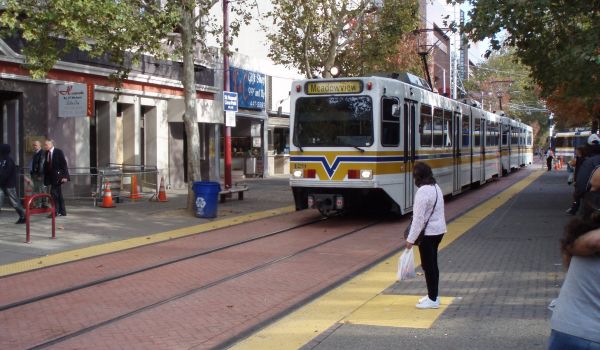Making public transportation systems more equitable requires going beyond the status quo, and no policies better define the status quo than federal regulations known by transit insiders as “Title VI”, in honor of the relevant section of the Civil Rights Act.
While many U.S. transit agency staff and leaders associate Title VI requirements with racial equity and social justice, these requirements do little to make transit more equitable. Rather, Title VI asks transit agencies not to let things get any worse, with no consideration or assessment of how equitable an existing transit system is today.
For social justice experts and advocates, “equitable” suggests something more ambitious, important, and challenging: proactively improving access to opportunity for those with the greatest transportation challenges, especially residents in low-income communities and communities of color.
Agency staff have a variety of tools beyond Title VI that they can leverage to advance racial equity and social justice in their transit systems and communities. Many of those are cataloged in TransitCenter’s recent report and accompanying video series, Inclusive Transit: Advancing Equity Through Improved Access & Opportunity.
Savvy transit agency leaders can also leverage Title VI policies and existing staff expertise to help integrate equitable planning practices into the fabric of an agency’s day-to-day practice. This is wonky territory, but understanding how to use Title VI requirements to improve outcomes requires an understanding of the overall Title VI process, which in broad strokes looks like this:
-
For service changes (which could include reorienting a route, altering service hours, or changing frequency), an agency must determine whether or not the change is considered “major” under the agency’s Title VI policy.
-
For “major” changes to transit service, and for any change to fare policy, the agency must evaluate whether the change creates a “disparate impact” on people of color relative to the population at large, according to the agency’s Title VI policy. The Federal Transit Administration (FTA) also requires agencies to analyze effects on low-income populations, although those populations are not legally protected.
-
If the proposed change is deemed to have a “disparate impact”, then the change must be revisited unless the agency deems that change to be the “least discriminatory alternative” or pens a “substantial legitimate justification” (in other words, a good enough excuse) for proceeding with the change.
Many key specifics of Title VI compliance are left to the discretion of transit agency governing boards, subject to federal oversight, since every region is different. This flexibility is necessary for the implementation to be practical, but it also offers enough wiggle room for agencies to effectively render compliance meaningless.
For example, transit agency boards must define what constitutes a “major” service change, and what counts as a “disparate impact” on communities of color, subject to a required public participation process. These technical thresholds have profound implications for how projects are vetted but receive little attention from transit agency boards. To make matters worse, official guidance provided by the FTA and the Department of Justice includes criteria that can easily be applied in problematic ways that run counter to Title VI goals.
The FTA allows agencies to use either census data (e.g., data about who lives near a changing route) or ridership data (i.e. demographic data about who uses a changing route) for Title VI analysis. But these are not comparable. In approved Title VI policies, agency boards should require staff to conduct both analyses when possible, since improving nearby residents’ access to transit (even if they don’t regularly use it) and improving experience for existing transit riders are both essential considerations in equitable transit planning.
Agencies also have the discretion to analyze service changes in isolation or bundle them together into a package of changes. There are pros and cons to each approach, but bundling can allow inequitable projects to advance simply by being grouped with an arbitrary bundle of sufficiently equitable projects. When board members allow bundling, they should take steps to ensure that bundled projects are related in a meaningful way and/or to require individual projects within a bundle to also be analyzed and reported separately.
There is also ambiguity in requirements to define agencies’ “service area population”, the demographics of which are the baseline for whether service changes disproportionately affect people of color. A “service area” could be defined as all residents in the agency’s jurisdiction (e.g., all residents of a given city, for a municipal transit system), or it could more narrowly mean all residents living within walking distance of an existing transit route—or something in between. Title VI policies should require planners to use a clear and consistent definition that maximizes agency accountability.
The upshot is that while there is no one-size-fits-all approach to transit equity analysis, thoughtful agency policies can ensure that such analysis is applied in a meaningful way. Because transit agencies are required to update their Title VI policies every three years, boards have a regular opportunity to revisit and strengthen these impactful, far-reaching policies.
Still, Title VI provides a floor, not a ceiling. At transit agencies with a goal to make their cities and regions more inclusive places to live, board members should strive to ensure that social justice is central to their agency’s everyday practices. Existing Title VI practices and staff members can create leverage for implementing this broader change, as recent work in Denver demonstrates.
Small changes in organizational structure can help embed equity throughout the planning process. Title VI analysts are often housed separately from the agency’s planning division, structurally reinforcing the notion that equity analysis is simply a box to check. Recognizing this problem, Denver’s Regional Transit District (RTD) moved their Transit Equity Manager from a siloed Civil Rights Division to the agency’s Transit Oriented Communities Division in the Planning Department.
Title VI and equity program staff also have skills that can make the agency more effective in many other aspects of project delivery. The success of equity program staff depends on their ability to constructively engage a diverse array of stakeholders—including both within the agency and in the communities the agency serves. Cultivating this engagement skillset can provide wide-ranging benefits to the agency.
For example, senior leadership at RTD appointed their Transit Equity Manager to lead an agency-wide Pass Program Study which involved the agency’s engagement with community stakeholders to take a deeper look at current pass programs with equity as a core value of the process. Not only does this make sense from a Title VI compliance perspective (any fare change triggers a Title VI analysis), but any agency-wide policy change inevitably impacts a diverse array of internal and external stakeholders. With the Transit Equity Manager at the helm of this process, strong stakeholder engagement meant the proposed policy was better positioned to gain broad support. Last month the RTD board approved the full recommendations of the Study’s Pass Program Working Group, which include the adoption of a discounted fare program for low-income residents to be launched alongside fare increases for other riders as of January 2019.
Improvements to public transportation networks can and should improve access to opportunities for people of color and in low-income communities. For that to happen, transit agency equity practice must go beyond baseline compliance with federal Title VI requirements. It is up to board members and senior leadership to proactively develop and implement policies and practices that affirm an agency-wide commitment to delivering equitable transit.

Zak Accuardi is a Nashville-based transportation and sustainability consultant and the author of TransitCenter's 2018 report Inclusive Transit: Advancing Equity through Improved Access & Opportunity. At TransitCenter, a national civic philanthropy working to improve public transit in US cities, he led practice-oriented research projects focused on new mobility options, declining transit ridership, and transit data policy, among other topics. He has a BS in environmental engineering from Columbia University and an MS in Technology and Policy from MIT.






_600_350_80_s_c1.jpg)









